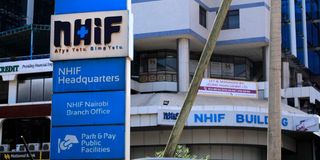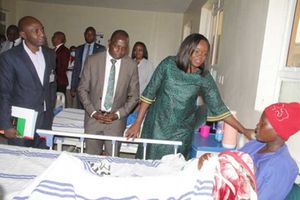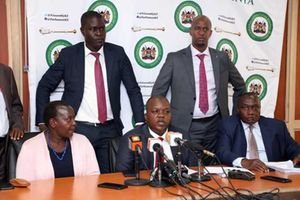
The offices of the now defunct National Hospital Insurance Fund (NHIF) in Nairobi. MPs want officials of the defunct NHIF investigated and prosecuted over Sh828 million scandal.
A parliamentary watchdog wants several officials of the defunct National Hospital Insurance Fund (NHIF) investigated and prosecuted on claims of colluding with hospitals to make fictitious payments amounting to Sh828 million.
The money was lost through fraudulent claims, including non-existent surgeries and other procedures for which hospitals across the country demanded payments.
According to a report by the National Assembly's Public Investments Committee on Social Services, Administration and Agriculture, led by Navakholo MP Emmanuel Wangwe, alarming discrepancies led to overpayment of Sh828,729,148 out of a total expenditure of Sh29.9 billion under the National Health Scheme Benefit.
An audit revealed overpayments of Sh94.8 million for CT scans, Sh16.1 million for MRI, Sh285.8 million for major surgeries and Sh29 million for minor injuries.
Overpayments were Sh25.5 million for basic chemotherapy, Sh3.6 million for specialised surgeries, Sh3.3 million for rehabilitation and more than Sh2.5 million for normal and Caesarean-section deliveries.
It emerged that Sh5.7 million was paid to NHIF-accredited hospitals for 656 duplicate Caesarean-section procedures allegedly carried out on the same patients.
An analysis of claims further revealed Sh247 million in duplicate payments under the National Health Scheme alone.
The National Health Scheme (NHS), dubbed “UHC Super Cover,” was the primary health insurance cover for all members and their declared dependents offering both inpatient and outpatient services as well as other special benefits.
The officials are believed to have colluded with hospital management and medical personnel to embezzle public funds by raising fictitious claims.
The National Assembly's Public Investments Committee has invited the Ethics and Anti-Corruption Commission (EACC) to investigate the roles the officers may have played in the irregular payments and submit a report to the Office of the Director of Public Prosecutions (ODPP).
“This is massive corruption, and the committee recommends that the EACC undertakes urgent investigations into all the persons who facilitated the overpayments of more than Sh828 million. The EACC should bite hard,” Mr Wangwe, the committee chairperson, said in the report.
“I want to call on the Ethics and Anti-Corruption Commission (EACC) to investigate the fraudulent claims processing and ensure that offenders are held accountable within three months.
“Instances of inflated costs for medical procedures such as C-sections, major surgeries, and overseas treatments are particularly concerning,” added the lawmaker.
Read:
The committee has recommended investigations aimed at holding accounting officers, board members and staff accountable for the financial irregularities.
The report has proposed measures, including the recovery of misappropriated funds at the prevailing Central Bank of Kenya lending rates.
The committee's findings pointed to systemic weaknesses in the processes of the defunct NHIF that left the fund vulnerable to exploitation.
According to the report hospitals often manipulated NHIF systems by using single case codes to claim multiple benefits.
This was made possible by the lack of integration between notification and pre-authorisation systems.
Some institutions also disguised fictitious claims by consolidating multiple treatment sessions, such as dialysis or chemotherapy into a single invoice.
The report also criticised NHIF’s poorly monitored benefit designs, which allowed hospitals to exploit loopholes.
An example cited by the committee chairperson was a hospital in Kikuyu Town that claimed to have performed more C-sections than the country’s largest referral hospital, Kenyatta National Hospital.
The committee has further recommended an investigation into NHIF’s systems to determine who facilitated the fraud and to ensure action is taken against those responsible.
MPs have emphasised the need for immediate action, including holding culpable officers accountable and initiating legal proceedings through the Directorate of Public Prosecutions (DPP).
The recovery of public funds lost due to overpayments was highlighted as a priority.
MPs want the committee's recommendations to be implemented in full.
“We must ensure our proposals are not shelved. This committee must keep tabs on implementation, especially within the specified three-month window,” said Kwanza MP Ferdinand Wanyonyi.
Nandi Hills MP Bernard Kitur said: “The EACC must move with speed and investigate the financial mismanagement, and those involved must face the full force of the law.” said Nandi Hills MP Bernard Kitur.
The spotlight now shifts to the EACC and the ODPP as Kenyans await their action.
This comes at a time when President William Ruto has ordered the payment of some claims by health facilities. He said the government will fully pay all health facilities with claims of Sh10 million and below.
The announcement, made on Wednesday, means that claims affecting public, faith-based, and private hospitals equate to 91 percent of the total facilities under NHIF.
However, hospitals with claims above Sh10 million will undergo a verification exercise that should be completed within 90 days after which a payment plan will be agreed upon.
The Health Cabinet Secretary will gazette the verification committee in the next week.
In a bid to address the standoff in the newly launched Social Health Authority (SHA), the government also committed to settling all pending arrears on a monthly basis.
So far, Sh18.2 billion of all undisputed claims have been paid. SHA has also settled all claims lodged since its inception on October 1, 2024.
Since its launch in November last year, the new Social Health Insurance Fund under SHA has faced criticism over system failures in hospitals, with many Kenyans calling for its abolition.
President Ruto, however, defended the new digital healthcare scheme, arguing that it would curb the fraud that paralysed NHIF.
The parliamentary report is expected to have far-reaching consequences for individuals implicated in the misuse of funds.
The committee had been investigating various audit queries involving the defunct NHIF and four other key institutions.
The report calls for a comprehensive review of internal controls within the newly formed Social Health Authority and the affected institutions to prevent mismanagement of public funds.
It also emphasises the need to strengthen accountability mechanisms within SHA to curb fraud and corruption.
By addressing these systemic challenges, the Wangwe-led committee aims to restore public trust and ensure responsible stewardship of public funds.








